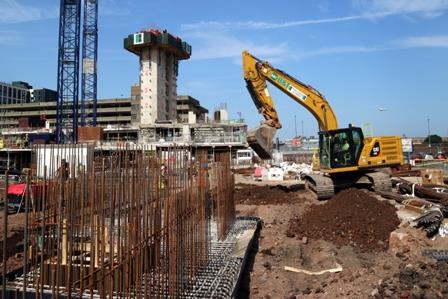
The Freight Transport Association (FTA) has told motortransport.co.uk that scrapping high-speed rail link HS2 would create "substantial problems" for tipper operators servicing current construction work.
The government is due to announce the results of a review of the scheme later this year amid rumours that the eventual cost may spiral to as much £80bn.
Phase 1 of HS2 between London and Birmingham is due to open at the end of 2026, with a second phase to Leeds and Manchester scheduled for completion by 2033.
However, earlier this month, Chief Secretary to the Treasury Liz Truss confirmed that the government is now taking a serious look “for the first time” at whether the proposed rail network can be delivered within its £56bn budget.
The news has spread alarm among tipper operators, many of whom have invested heavily in expanding their fleets to meet potential demand.
“If the government simply abandoned the HS2 work today and did nothing else that could cause very substantial problems for a lot of businesses who anticipated servicing these contracts,” said FTA head of UK policy Chris Snelling.
“HS2 is going to be vital to those operators because a lot of people will have scaled up in anticipation of doing this work. In particular, HS2 has said you‘ve got to have cleaner Euro-6 vehicles to do a lot of the work so a lot of people will have made sure they have the right kind of fleet. This is the sort of long-term planning that people would go into to service HS2.
“It’s possible that some people have gone out and purchased or leased Euro-6 vehicles to do this kind of contract. So if that then disappears they’re even more out of pocket.”
Snelling went on to explain that the situation had wider implications for operators than just supply issues.
“As far as commercial vehicles go it’s not just about the suppliers to HS2,” he said. “We’ve been having multiple presentations to all our members about the problems the construction is going to cause to the road networks, because of the goods being supplied and what has to be closed and when. Now suddenly you’ve got this question mark about whether you need to be preparing for all of that or not.”
However, Snelling suggested that the government would be unlikely to abandon the project altogether and it may instead be scaled down in terms of the length of the line or the speed trains could reach.
“I think losing the work is by far the biggest concern,” Snelling added. “Hopefully tipper operators would be able to replace it with other work but does other work exist? If they continue with another five years of work but then it comes to a halt it might not have too much effect because operators won’t have planned on getting an eternity of work. If they’re building a slightly different kind of railway line it might not make too much difference to the people supplying materials.
“Obviously the government has the option of investing in other infrastructure projects and people could service those instead, so it does depend what else they plan. I don’t see that the government would simply abandon it and walk away. They may scale it down but I would expect tipper operators to pick up other projects to do the same work. There are other ways to try to fulfil this need. They might start investing in those.”
Asked when operators might get more clarification on the situation, Snelling admitted the current uncertainty may last for some time.
“We don’t know with the political situation at the moment,” he said. “HS2 stands alone from anything else anyway. We’re half expecting there to be an election. Will there be an announcement before the election? Probably not. Will they want to make an announcement before Brexit? Possibly not. We just don’t know.”














